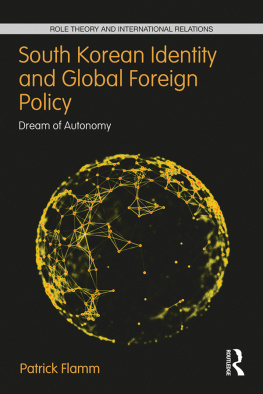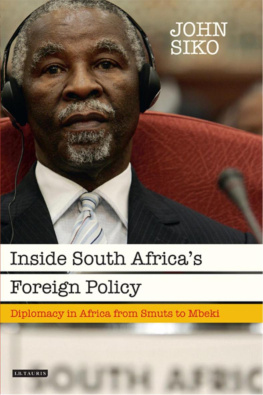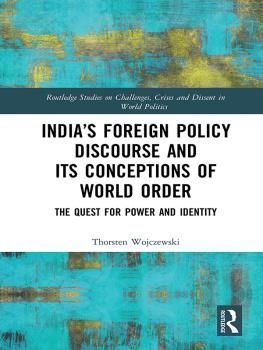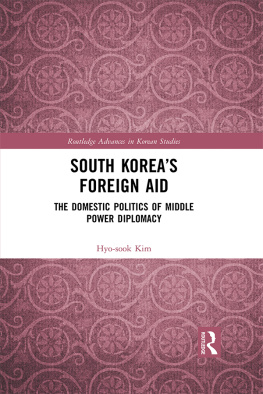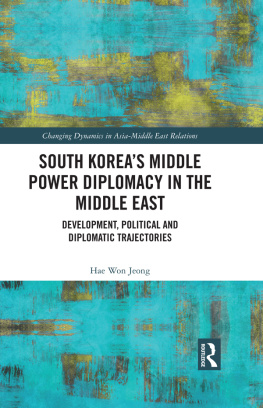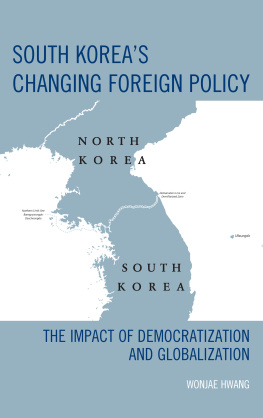South Korean Identity and Global Foreign Policy
In the 20th century, South Korea was usually seen as a shrimp among whales, a minor player with limited agency in regional and global affairs. Koreas risen status as a middle power today, however, begs the question about related changes in the South Korean identity or sense of self in the world.
In this book, Patrick Flamm presents the first comprehensive and agency-oriented empirical account of South Korean international state identity and Seouls global foreign policy in the 21st century. Advancing a performative and narrative understanding of identity in International Relations, Flamm uses South Koreas global engagement in peacekeeping and climate diplomacy to offer much-needed insight into the various identity narratives and role conceptions at play. In the case of peacekeeping and climate diplomacy, South Koreas identity as an international actor has been dominated by practices of self-identification that position the country at the brink of advanced countries, aspiring to lead the rest of the world but with the overall objective to maintain national autonomy in a changing regional and global context.
South Korean Identity and Global Foreign Policy is a must-read for scholars of International Relations, Foreign Policy Analysis, and Asian/Korean Studies.
Patrick Flamm is Lecturer in International Relations at the School of History, Philosophy, Political Science and International Relations at Victoria University of Wellington. His research interests are South Korea as a rising power in global affairs, identity and foreign policy, as well as international environmental and Antarctic politics. Patrick studied Political Science and International Relations at Goethe-University Frankfurt, Germany, and Korea University, Republic of Korea, and holds a PhD in Asian Studies from the University of Auckland.
Role Theory and International Relations
Edited by Cameron G. Thies
Arizona State University
Juliet Kaarbo
University of Edinburgh
The Role Theory and International Relations Series aspires to attract and publish the latest and best research integrating knowledge in the field of International Relations with role theory. This aspiration cuts across a wide swath of subfields, including foreign policy analysis, peace and security studies, international political economy, diplomatic studies, and international organization. While each of these subfields of study is presently organized as an island of theory, this series intends to integrate their signature phenomena within a system of knowledge, a theory complex or an alliance among different subfields. This series showcases the ability of role theory to generate useful theoretical insights on its own or in combination with existing theories across these traditional subfields. Role theorys conceptual repertoire, plus its ability to span multiple levels of analyses and the major meta-theoretical divides in the discipline position it to be an important integrative force in the study of International Relations.
Domestic Role Contestation, Foreign Policy, and International Relations
Edited by Cristian Cantir and Juliet Kaarbo
Role Theory and Role Conflict in U.S.-Iran Relations
Enemies of Our Own Making
Akan Malici and Stephen G. Walker
South Korean Identity and Global Foreign Policy
Dream of Autonomy
Patrick Flamm
Role Theory in the Middle East and North Africa
Politics, Economics and Identity
Yasemin Akbaba and zgr zdamar
For more information about this series, please visit: www.routledge.com/Role-Theory-and-International-Relations/book-series/RTIR
First published 2019
by Routledge
52 Vanderbilt Avenue, New York, NY 10017
and by Routledge
2 Park Square, Milton Park, Abingdon, Oxon, OX14 4RN
Routledge is an imprint of the Taylor & Francis Group, an informa business
2019 Taylor & Francis
The right of Patrick Flamm to be identified as author of this work has been asserted by him in accordance with sections 77 and 78 of the Copyright, Designs and Patents Act 1988.
All rights reserved. No part of this book may be reprinted or reproduced or utilised in any form or by any electronic, mechanical, or other means, now known or hereafter invented, including photocopying and recording, or in any information storage or retrieval system, without permission in writing from the publishers.
Trademark notice: Product or corporate names may be trademarks or registered trademarks, and are used only for identification and explanation without intent to infringe.
Library of Congress Cataloging-in-Publication Data
Names: Flamm, Patrick, author.
Title: South Korean identity and global foreign policy : dream of
autonomy /Patrick Flamm.
Description: New York, NY : Routledge, 2019. | Series: Role theory
and international relations; 8 | Includes bibliographical references
and index.
Identifiers: LCCN 2018060206 (print) | LCCN 2019009078 (ebook) |
ISBN 9780429202186 (Master) | ISBN 9780429510809 (Adobe) |
ISBN 9780429514234 (ePub3) | ISBN 9780429517662 (Mobi) |
ISBN 9780367192754 (hbk) | ISBN 9780429202186 (ebk)
Subjects: LCSH: Korea (South)Foreign relations21st century. |
Peacekeeping forces, South Korean. | Climatic changesGovernment
policyKorea (South) | Environmental policyInternational cooperation.
Classification: LCC JZ1747 (ebook) | LCC JZ1747 .F53 2019 (print) | DDC
327.5195dc23
LC record available at https://lccn.loc.gov/2018060206
ISBN: 978-0-367-19275-4 (hbk)
ISBN: 978-0-429-20218-6 (ebk)
Typeset in Times New Roman
by Apex CoVantage, LLC
For Katharina und Nikolaus Thun, my dear grandparents
I would like to thank and acknowledge a few persons and institutions without which this book would not exist: at the University of Auckland, Changzoo Song for his unshakable optimism and trust and Rumi Sakamoto for the enduring encouragement and support. David Hundt at Deakin University and especially Cameron Thies at Arizona State University provided very constructive feedback on my work, which proved invaluable for the revision stage. It was Cameron who suggested I write a book for the Role Theory and International Relations Series , of which he is the editor together with Juliet Kaarbo. Thank you all for your immense support and advice. At Routledge, I would like to thank Natalja Mortensen, who was very supportive and always helpful.
During my PhD I was lucky enough to receive a very generous Korean Studies Doctoral Scholarship from the University of Auckland and was also able to spend a few months at the Academy of Korean Studies in Seongnam, South Korea, as a postgraduate fellow. Thank you for this crucial financial support during my studies. Furthermore, I would like to express my gratitude to the Korea Foundation for the one-year postdoctoral fellowship that brought me to Victoria University of Wellington and enabled me to focus on the revision of the book manuscript. At Victoria, I would like to especially thank Xavier Marquez and David Capie, as well as Jonette Crysell, Sam Bigwood and Caroline McDonald, for welcoming me to Wellington and making me a part of the Political Science and International Relations Programme. Thank you for the opportunity to be a part of this fantastic academic and collegial environment.

